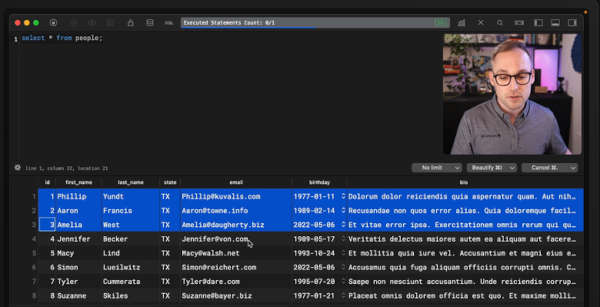| PlanetScale's MySQL Course For Developers |
| Written by Nikos Vaggalis |
| Tuesday, 18 April 2023 |
|
Here's a free course on MySQL with a focus of using it as a Developer. While it is taught by Aaron Francis, Developer Educator at PlanetScale, the serverless MySQL platform, it applies to any MySQL instance and isn't PlanetScale-specific. Using a DBMS can be viewed from different angles depending on who's looking, the DBA or the Developer. The dev's job should be on the application layer underpinned by the DBMS. That is, to build an efficient database and that means to make an efficient schema , choose the right data types and optimizing for fast data retrieval. That means tweaking sql queries and using indexes and not meddling with the underlying dbms caches and other configuration options or generating table statistics. Of course, the ultimate match in heaven would be someone with the skills of a database developer and a DBA at the same time, a role that many devs reluctantly assume in cases where no in-house dba is available. So as said this course is designed specifically for developers and does not require prior knowledge of database development; it is specifically focused on MySQL and shows how to use it effectively as an application developer.
The course is made by Aaron Francis who is a Developer Educator at PlanetScale , the serverless MySQL platform, who kindly offer it as free. Note that the material applies to any Mysql instance out there, and is not Platescape product specific. The course is just over 7 hours long, split into 64 videos, across 4 different sections: 1. Schema - how to build efficient and effective tables 2. Indexes - how indexes work and how to use them well 3. Queries - how to query your data in the most efficient way 4. Examples - real world examples application developers would face In Chapter 1 we find some good introductory guidelines for designing good schemas like how to store Integers or Floats correctly, the different type of strings (varying length, fixed length, binary) as well as character sets and collations. Chapter 2 is on the very important topic of indexes and their underlying B-Tree physical data structures. Prefix, Composite, Covering, Functional, Fulltext, Invisible indexes, it's all there. Of course the chapter wouldn't be After covering the indexes we move on to building our first queries with SQL in Chapter 3. From simple Joins, limiting rows and subqueries to CTE's and Recursive queries. Finally Chapter 4 is all about practical examples that combine everything learned up to this point. These include :
and so on. In wrapping it up, I can say that this is first class material, taught in a very approachable way by Aaron. It won't turn you into an expert overnight, but guided by its holistic overview of the most common database functionalities that an application developer has to be familiar with, you’ll be able to quickly construct solid database-driven applications. Recommended. More InformationRelated ArticlesOtterTune AutoTweaks Your DBMS With Help From ML Entity Relationship Diagraming with ERDLab
To be informed about new articles on I Programmer, sign up for our weekly newsletter, subscribe to the RSS feed and follow us on Twitter, Facebook or Linkedin.
Comments
or email your comment to: comments@i-programmer.info |
| Last Updated ( Tuesday, 18 April 2023 ) |




